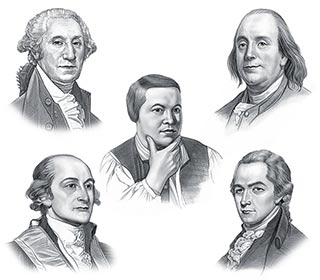The Stamp Act was first direct tax to be levied on the American colonies. It was the first serious attempt to assert governmental authority over the 13 colonies. For fast facts refer to the article on the Facts about the Stamp Tax.
What was the Stamp Act?
The Stamp Act required various items such as licenses, documents, diplomas and nearly every paper item to be printed on stamped or embossed paper in the American colonies. This meant that the American colonists were obliged to pay a fee on almost every piece of paper used for legal documents. The colonists were obliged to pay extra for things that were used on a daily basis, such as newspapers. Basically anything printed on paper, except books, was taxed. The people who created public documents had to pay a tax on blank paper and then officials would place a stamp as proof of payment. The British Parliament granted colonists the right to select American tax collectors for the job. The people who were most effected by the Stamp Act were lawyers, ministers, printers and merchants. These colonists were men of wealth and standing in the community and some of the most influential people in society.
Purpose of the Stamp Act of 1765
The Purpose of the Stamp Act of 1765 was to:
- Raise revenue to pay clear the War Debt incurred during the French Indian Wars (Seven Years War)
- Raise revenue to pay for the military presence in the American colonies to enforce the new taxes
- Divert new taxes and duties from Britain to the American colonies
- Assert British governmental authority over the American colonies
- Re-enforce the polices of previous Acts in relation to duties, taxes and currency - refer to Revolutionary Timeline and Colonial, Continental and Revolutionary Currency
- Implement new taxes on paper documents
No Trial by Jury for anyone who offended the Stamp Act 1765
The fines and penalties for anyone offending the Stamp Act were harsh and these penalties caused even more consternation as any cases were heard by the Admiralty Courts. The Admiralty Courts had been originally instituted to try violations of the law on the high seas - refer to the Navigation Acts. The British had used the Admiralty Courts in America to try individuals believed to be evading duties or smuggling. There was no trial by jury in the Admiralty Courts. Cases were decided by judges rather than juries.
The Colonists Reaction to the Stamp Act of 1765
The Stamp Act of 1765 was seen as detrimental to Colonial America and sewed the seeds of dissension and rebellion in the colonies. The colonists outrage and violent reaction to the Stamp Act came as a great surprise to the British government. The British believed they had a right to enforce their trade policies and taxes as the Mother Country. And the colonists had become accustomed, to a limited degree, to the British regulation of trade and taxes. So what was the difference between the Sugar Act and the Stamp Act, why was the reaction to the Stamp Act so strong, what was the significance of the Stamp Act?
Significance of the Stamp Act of 1765
The Significance of the Stamp Act was extremely far reaching. The following points raise the elements that contributed to the significance of the Stamp Act of 1765:
- The previous policies and taxes had only applied to specific types of trade and commerce in the different areas of the American colonies
- The taxes levied by the Stamp Act were not to regulate commerce and trade, but to directly grasp money out of colonists
- The Stamp Act effected all of the colonists
- The colonies believed that the Stamp Act was a deliberate attempt to undercut their commercial strength and their independence
- The tax was introduced by a direct order from Britain without approval of the colonial legislature
- The Stamp Act was the first direct tax, a tax on domestically produced and consumed items, that Parliament ever levied upon the colonists
- The colonists viewed the British regulation of trade as legal but the British imposition of internal taxes on the colonies, was perceived to be illegal
- The act was to be enforced by stamp agents, with penalties for violating the act to be imposed by vice-admiralty courts, which sat without juries
- The colonists believed in their rights to trial by jury
- The Stamp Act united the colonists in New England, the Middle and the Southern colonies and stirred a storm of protest in the New World
- The Stamp Act led to the first concerted effort by the American colonists to resist the British Parliament and the authority of Great Britain
- The high taxes on lawyers and college students were designed to limit the growth of a professional class in the American colonies
- The Stamp Act was viewed by the American colonists as a means of censorship, or a "knowledge tax," on the rights of the colonists to write and read freely
- The opposition to the Act was led by the most influential segments of colonial society. These men were most affected by the Act and included lawyers, clergymen, journalists, publishers, land owners, ship builders and merchants
- The Act led to the doctrine of 'consent by the governed'
- The Stamp Act of 1765 led to the creation of resistance groups such as the Sons of Liberty
- The Stamp Act crisis led the colonists to perceive themselves as American rather than British
